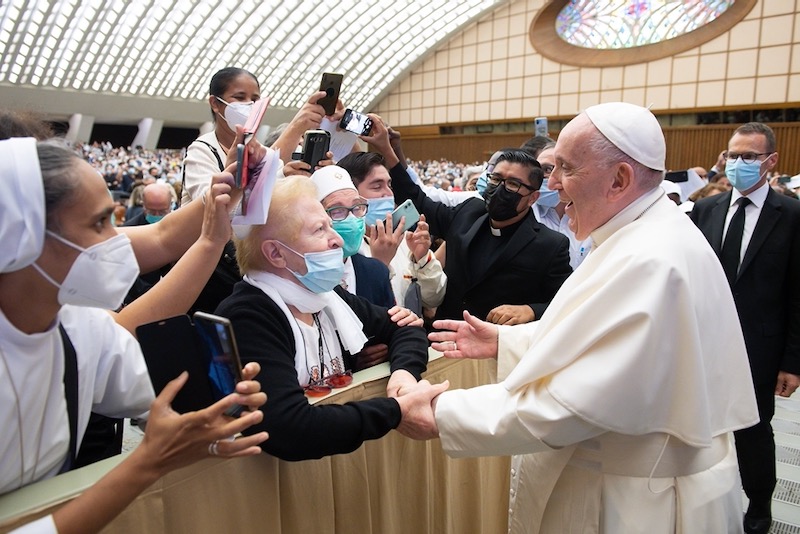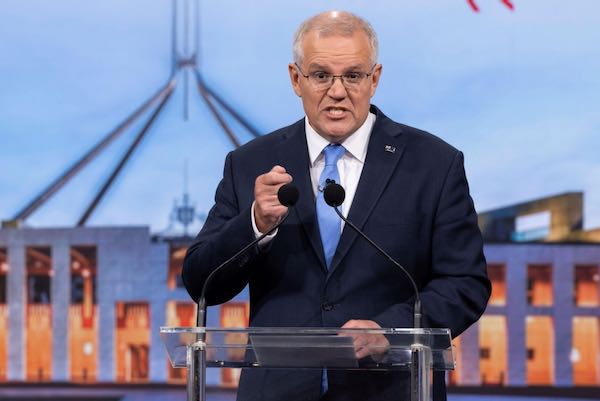Australia’s Catholic bishops have called for a political shakeup as the country heads to an election on 21 May, with the future of the country’s prime minister, Scott Morrison increasingly uncertain.
As cost-of-living pressures dominated political leaders’ campaign agenda across the country, the Australian Catholic Bishops’ Conference (ACBC) released a statement encouraging voters to consider the nation’s most vulnerable people.
Outgoing ACBC president, Brisbane Archbishop Mark Coleridge said: “No one political party fully embodies Catholic social teaching”.
“We all long for what Pope Francis calls a better kind of politics, one truly at the service of the common good,” said Archbishop Coleridge, who will step aside from the ACBC leadership in July.
Scott Morrison, 53, a former tourism marketing chief who has been prime minister for almost four years, has put economic stewardship and national security at the forefront of his Liberal-National coalition campaign.
With unemployment near a 48-year low of less than 4 per cent, the economy returning to pre-pandemic levels and with a volatile global security outlook, Morrison has told Australians this election is no time for change.
However, newspaper polling points to the opposition Labor Party, led by Anthony Albanese, 59, holding a slight advantage over the conservative coalition.
Polling indicates both major parties are in decline, leaving several outcomes open, including the prospect of a hung parliament.
In their election statement, Australia’s Catholic bishops did not endorse any political party but said voters should consider candidates who might prioritise people who need palliative care, those in low-paying and insecure jobs, indigenous Australians, asylum-seekers and refugees.
“Since the last federal election, we have seen the impact and the challenges of a global pandemic, floods, summers of bushfires, wild weather events and a world on edge because of military conflict,” Archbishop Coleridge said.
“Foremost in the minds of many will be Australia's economic recovery from the effects of Covid-19. The societal disruptions from the pandemic have revealed significant levels of poverty and disadvantage within Australia. We need a new social contract that focuses the economy more clearly on the common good.”
Access to palliative care is essential, the bishops said, so that the dying are not pressured into opting for assisted suicide, which has now passed into law in five of Australia’s six states.
The bishops urged an increase in minimum wage “to at least meet the poverty line” and advocated for “greater investment in affordable and social housing”.
They also said religious agencies, including schools, need to be able to preferentially hire staff who support their mission.
“We call only for the same level of protections against discrimination on the basis of religion that Australia already has on the basis of race, sex or age,” the bishops said.
The bishops called for indigenous Australians to be recognised in the constitution and given a permanent voice in parliament.
They asked for a greater intake of refugees from Afghanistan - 20,000 additional places – and a special intake of Ukrainian refugees, saying they require “similar mercy”.
The bishops called for a wider reassessment of refugee policies, saying the people fleeing violence or persecution have a “moral claim on our assistance, whether they fit legal definitions of a refugee or not”.
• Morrison backs religious discrimination act
Prime Minister Morrison is standing by a decision to push ahead with plans for a religious discrimination act – a piece of legislation supported by the Catholic Church because it would allow faith groups the freedom to run schools, social welfare, hospitals and aged care according to their beliefs and ethos, writes Mark Bowling.
“Protection from discrimination and the liberty to run religious organisations on the basis of their faith-inspired mission are fundamental human rights that deserve to be protected,” the Catholic bishops’ statement to voters said.
Mr Morrison failed to deliver a bill against religious discrimination during the last parliament – he withdrew it in February in the face of amendments being forced by Labor, the Greens party and five Coalition senators.
His opponents on the issue object to a provision in the bill that would give religious schools a legal exemption to discriminate against students on the basis of sexual orientation and gender identity – covering both gay and transgender students – including by expelling them.
During election campaigning, Mr Morrison said there is no evidence of students being expelled, however he argued that religious Australians are being discriminated against “every day” – hence his determination to press ahead with the legislation.
His opponents have refused to support religious freedom laws unless the PM agrees to simultaneously amend the country’s Sex Discrimination Act to protect LGBTQ students.



 Loading ...
Loading ...